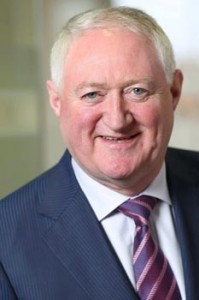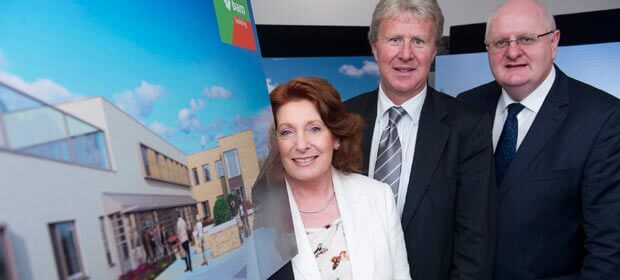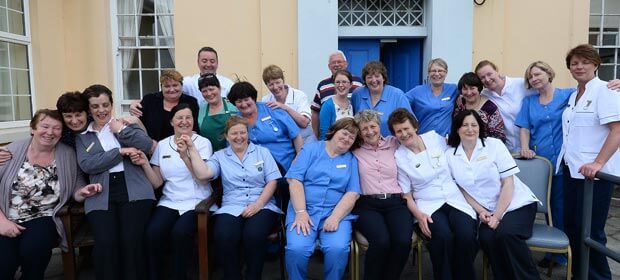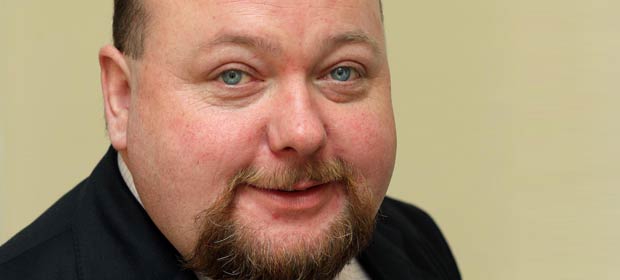- Major expansion of renal care facilities
- National Lead for Transformation and Change
- Independent chair appointed
- Acting NTPF CEO
- Entries open for 2013 Irish Healthcare Awards
- New Mental Health In-Patient Unit at CUH
- Ireland twins with hospitals in developing world
- New Primary Care Centres
- New hospital for Kenmare
- Mater Private wins WHO Award
Major expansion of renal care facilities
The Government is to invest €14.5million as part of a phased expansion of the renal care facilities at Dublin’s Beaumont and Connolly Hospitals.
The investment includes €8.5m on the expansion of the living donor transplant programme and the development of existing operating, ward and laboratory facilities to accommodate the expansion. Health Minister, Dr. James Reilly said this was a major step towards achieving the aim of 250 kidney transplants annually from both deceased and live donor transplant programmes.
The Minister also confirmed an added investment of €6m in a new, 34 stationed, outpatient Renal Dialysis Unit, increasing capacity for provision of renal dialysis to outpatients at Beaumont by 55%.
He said the expansion of the National Transplant Programme would result in a reduction of waiting list times and a reduction of the need for long term dialysis. This would accrue savings of approximately €250 million over a 10 year period.
In conjunction with the announcement, Beaumont Hospital has launched a new website www.beaumontkidneycenter.ie where potential living kidney donors and recipients can start the process of living donor evaluation.
In addition to the redevelopment of facilities at Beaumont, the investment incorporates further development of Urology services at Connolly Hospital. This will enable the two hospitals to prioritise and plan the deployment of resources on a shared basis. This is a prime example of how the recently announced Hospital Groups framework can enable two major hospitals to work together to achieve improved health outcomes for patients in a region, said Dr. Reilly.
Mr. Liam Duffy, CEO, Beaumont Hospital said “This welcome investment in an expansion of national and regional renal services is a very significant boost for Beaumont. It comes at a time when we can report significant reductions in the number of patients awaiting long-term care and major improvements in the responsiveness of our ED. Those achievements underpin our determination to provide safe quality care to the local and national population. They come from sustained effort within both the Hospital and the wider healthcare community, allied with the support of the Department of Health through the SDU. We look forward to further improvement and further investment in key national programme areas over the coming months”.
Professor Peter Conlon, Clinical Director of the Transplantation, Urology and Nephrology Directorate and Consultant Nephrologist, Beaumont Hospital said: “We are delighted to have successfully secured funding for the development of the national renal transplant programme in Beaumont Hospital. Increasing transplants to 250 per year is a major step forward in transforming the treatment of kidney failure in Ireland. We are constantly striving to provide the best care and service in a safe environment for our patients and the Living Donor Programme can offer patients a second chance at living a healthy and happy life. Kidney transplantation provides the best quality of life for patients with kidney failure, more than doubles their life expectancy compared to remaining on dialysis and, in the process, each kidney transplant saves the state in excess of €750,000 over the life time of the transplant.”
Beaumont Hospital has performed close to 4,000 kidney transplants over the last 50 years. In 2012, the transplant unit in Beaumont Hospital achieved 163 kidney transplants.
National Lead for Transformation and Change

Mr. Leo Kearns, CEO of the RCPI has been co-opted to the HSE as National Lead for Transformation and Change for a two year period.
He joins the office of the Director General, Mr. Tony O’Brien, where he will head up the HSE Systems Reform Group. According to Mr. O’Brien, this group will co-ordinate all system reform processes and assist in ensuring that the health service delivers on its responsibilities in the system and organisational reform required under the Government’s policy Future Health.
RCPI President, Prof. John Crowe welcomed the appointment, saying it would put Mr. Kearns at the centre of all major changes in the Irish health services.
Independent chair appointed
The Minister for Health, Dr. James Reilly has announced the appointment of Mr. Pat McLoughlin as Independent Chair as part of the Consultative Forum on Health Insurance.

His role will be to work with insurance companies and the Department of Health to effect real cost reductions in the private health insurance market.
Commenting on the rising cost of insurance claims at a time of general deflation and private and public sector pay cost reductions, Minister Reilly said “private health insurance costs are simply unsustainable at present and I want insurers to address the base cost of their claims. Mr. McLoughlin, working with the insurers and officials from my Department, will be charged with identifying effective cost management strategies that all insurers can adopt, thereby ensuring the long-term sustainability of the private health insurance market. I want to see all procedures provided in an appropriate, safe healthcare setting for patients, which also provides value for money for consumers”.
The Minister concluded “given his extensive public and private sector experience I am confident that Mr. McLoughlin will deliver on this task”.
Mr. McLoughlin, is currently the Chief Executive of the Irish Payment Services Organisation. Previously he was Director of the National Hospitals Office and Deputy CEO of the HSE.
He has participated in national public expenditure reviews. He was a member of the Special Group on Public Service Numbers and Expenditure Programmes (also known as An Bord Snip Nua) and Chair of the Local Government Efficiency Review. He was also a member of the Task Force on Child and Family Support Agency.
Acting NTPF CEO

Mr. Ian Carter, HSE National Director Designate of Acute Hospitals has been appointed Acting CEO of the National Treatment Purchase Fund. He succeeds Dr. Alan Smith, who resigned as acting CEO earlier this month, having held the post since last October.
The NTPF, which was established in 2004, has a budget of €13.987 million this year. The Minister for Health, Dr. James Reilly adapted its role to support the work of the Special Delivery Unit (SDU) to free up access to secondary services. The Minister sees the NTPF as a core part of the SDU’s performance improvement role. The SDU has been transferred operationally to the Health Service Executive but it is retaining its separate identity
Dr. Martin Connor, who was appointed senior policy advisor to the SDU on its establishment, left his post earlier this year – a year before the expiry of his contract.
Entries open for 2013 Irish Healthcare Awards
The Irish Healthcare Awards are now open for submissions. Entries are welcome from individuals and institutions involved in acute and primary care, public health, those in the private sector and others with an interest in healthcare. The closing date for submissions is Wednesday August 21, with winners announced at a gala event in Dublin’s Shelbourne Hotel on November 7.
Entries are evaluated by a panel of judges who reward innovation, excellence and achievement in the Irish health system and recognise projects that have made a positive contribution to patient care. The awards cover the fields of education, management, healthcare delivery and collaboration, pharmaceutical innovation, and patient support.
“The Irish Medical Times is proud to host the Irish Healthcare Awards for a twelfth year,” said Mr. David Kelly, Publisher, Irish Medical Times. “The Awards have become an annual celebration of the exemplary work done in the health sector. Those working in the health service and related industries rarely get recognised for the excellent work they carry out every day throughout the country.”
Last year, St. James’s Hospital was awarded the best overall prize, ‘An Duais Mhór’, for its study on understanding and managing persistent cancer-related fatigue. The Dublin hospital also topped the Best Hospital Project category, which received a significant number of entries from across the country.
At the 2012 ceremony, Cork consultant Dr. William Fennell was presented with a Lifetime Achievement Award for his extensive work in cardiology. Dr. Fennell has led a distinguished career including a term as President of the Irish Cardiac Society, Chairman of the Irish Board for Training in Cardiovascular Medicine and President of the Irish Heart Foundation. He is currently director of Training in Cardiology for the Irish Committee on Higher Medical Training.
Other winners in 2012 included the Irish Cancer Society, Sligo General Hospital, Mallow Primary Healthcare Centre, Tallaght Hospital and Cork University Hospital.
Submissions can be entered in any of the following categories and are welcomed from all areas of the health sector, both public and private:
- Best Education Project – General Practice/ Pharmacy
- Best Public Health Initiative
- Excellence in Healthcare Management
- Nursing Project of the Year
- Best Patient Education Project – Non-Pharmaceutical
- Patient Organisation Project of the Year
- Student Project of the Year
- Best Educational Meeting
- Outpatient Initiative of the Year
- Best Patient Education Project – Pharmaceutical
- Best Hospital Project
- Best Pharmaceutical Marketing Campaign
- Best Use of Information Technology
- Best Patient Lifestyle Education Project
- Lifetime Achievement Award
For further information on the awards, or to obtain an entry form, contact:
Wayne Leitch, MPI Media Ltd, Merchants Hall, Merchants’ Quay, Dublin 7.
Tel: (01) 817 6330 and email: wayne.leitch@imt.ie
New Mental Health In-Patient Unit at CUH
The sod has been turned to mark the beginning of a new €15 million acute adult mental health in-patient unit on the Cork University Hospital campus. It will replace the existing 46 bed unit.

The sod turning ceremony was performed by Kathleen Lynch T.D., Minister of State at the Department of Health with responsibility for Mental Health. Being developed in line with the requirements of A Vision for Change, the new, purpose built in-patient unit will provide accommodation for patients with a mental illness requiring mental health assessment, treatment and rehabilitation. The unit will provide a better environment for patients and will have an increased number of single rooms and therapy rooms. It will include two 18-bed wards (all single en-suite rooms), a six-bed assessment/high observation ward, and an older person eight-bed ward, also with single rooms. The facility is also configured to be capable of providing a service to mother and infants in partnership with other services on site.
Dr. Eamonn Moloney, Executive Clinical Director, HSE Cork South Mental Health Services said, “This investment in our mental health services is most welcome. The new unit will provide a much enhanced therapeutic environment for our patients and will enable us to cater specifically for client groups with particular requirements including older people. The new unit is very much a positive step forward and something that is welcomed by all staff working in the service.”
Mr. Pat Healy, Regional Director of Operations, HSE South said, “A key priority for the HSE South has been to reconfigure acute inpatient services in line with the recommendations of A Vision for Change. This unit has been designed in accordance with the principals of the mental health policy document and marks a significant milestone, and investment, in the development of mental health services in Cork.”
The unit will be located in the north-west corner of the Cork University Hospital campus and will also have clinical/therapy facilities and associated office accommodation. Outpatient facilities will continue to be provided in the main CUH Outpatient Department and in the local community.
It is envisaged that the entire construction project will be completed within 15 to 18 months.
Ireland twins with hospitals in developing world
An innovative programme to tackle HIV and improve healthcare for women and babies by twinning Irish hospitals with counterparts in the developing world, to share skills and experience, has been launched by Mr. Joe Costello, T.D., Minister for Trade and Development.
ESTHER Ireland is led by a partnership between the Health Service Executive (HSE) and Irish Aid and forms part of a wider European alliance of hospitals and healthcare institutions working with the developing world.
Ireland has approved its first two ESTHER Ireland partnerships: Cork University Maternity’s Hospital’s partnership with the Omdurman Maternity Hospital in Sudan and the collaboration programme between the Royal College of Surgeons in Ireland and the College of Surgeons of East, Central and Southern Africa.
Minister Costello said they were already seeing very encouraging results: The partnership between Cork University Hospital and the Omdurman Maternity Hospital in Sudan was associated with an 86 per cent reduction in maternal mortality and a 50 per cent drop in stillbirths and early neonatal deaths in the Sudan hospital.
He said partnerships such as these would contribute to major, sustainable improvement to health systems in those countries which are most vulnerable. They would also benefit Irish health professionals, who would gain invaluable experience and new skills. “The Government’s new Policy on International Development commits us to harnessing the skills of Irish health experts and institutions to improve access to quality essential health services.”
Ireland will focus on partnerships in Africa and draw upon the extensive first-hand experience that many health workers in Ireland have gained from working overseas.
Speaking at the launch, Tony O’Brien, Director General Designate of the HSE said: “ESTHER Ireland builds on links already established by Irish health institutions with developing countries. The partnership approach means there are benefits on both sides, and the programme will contribute to improving quality of health care in Ireland as well as in the partner countries.”
The ESTHER Alliance is a French acronym for ‘Together for a Networked Hospital Therapeutic Solidarity’. Members include France, Italy, Spain, Germany, Norway and Switzerland. It is active in over 40 partner countries Africa, southeast Asia, Central and South America, the Middle East and southeast Europe with more than 120 projects being supported. The Alliance is committed to developing high quality partnerships and ESTHER projects are based on best development practice. www.esther.eu
ESTHER Ireland aims to strengthen health systems and particularly human resources so as to tackle HIV and other major diseases and to improve women, children and newborn health in Africa and Asia. It will use the twinning model to foster effective north-south and south-south partnerships. www.esther.ie
ESTHER Ireland will be directed and overseen by a steering group with membership from the HSE, Irish Aid, Irish hospitals and the Irish Forum for Global Health.
New Primary Care Centres
Twenty seven primary care centres have been opened in the last two years, according to the Department of Health.
Seven are in HSE Dublin Mid Leinster, seven are in Dublin North East, seven are in HSE south and six in HSE West.
At present, construction has been started in six other centres via operational lease and planning permission has been granted at a further 17 locations and it is hoped that these will be completed by late 2016. The centres are being progressed through direct build, operational leases and public private partnerships.
The Department said that there are at present 95 locations with accommodation to support primary care teams.
New hospital for Kenmare
A new 40 bed hospital has been opened in Kenmare, Co. Cork, to provide residential care for people in the region as well as a wide range of community supports, including convalescent, respite and hospice care.
Built at a cost of €8 million it replaces the existing 24 bed facility providing a much enhanced environment for residents, staff and visitors.

Speaking on the day residents moved from the old facility to their home in the new hospital, Mr. Michael Fitzgerald, Area Manager, HSE Kerry said “We are delighted to welcome the residents to their new home and staff to this wonderful new facility. While the move is not physically all that far in terms of distance as the new hospital has been built alongside the old hospital, the new hospital is designed and built to ensure the utmost comfort and optimal care facilities for patients now and into the future. The transfer to the new hospital is indeed an emotional one for all concerned and the new hospital, together with the existing Primary Care Team services in South Kerry, heralds a new era in heath care provision to the area.”
In addition to the new residential care beds that will be available, the facility also provides a mental health day care centre, as well as a new ambulance base for the local catchment area. The mental health day care centre will replace the existing, smaller mental health day care centre in Kilgarvan.
Ms. Margaret O’ Sullivan, A/Director of Nursing at Kenmare Community Hospital said, “The new hospital is built on two levels and has the comfort of older people in mind which will make an enormous difference to the lives of our residents. The hospital has its own landscaped garden areas for residents to enjoy and, most importantly, people from the South Kerry area will be able to continue to avail of long term care, respite and palliative care in their own area. In addition, the new unit has a specific Hospice Friendly suite for family and carers of relatives who require the service. The suite which features a separate sitting room, kitchenette, convertible sofa bed and its own toilet facilities has been made possible as a result of local donations and I want to pay tribute to all who fundraised for this suite over the years”.
Mr. Pat Healy, Regional Director of Operations, HSE South said “Locating a number of additional HSE services on the hospital campus is also significant for the local area and will further enhance health service delivery locally.”
Mater Private wins WHO Award
The Mater Private Hospital in Dublin has been ranked as the No 1 hospital in Europe for Hand Hygiene by the WHO.

As part of the global campaign “Save Lives: Clean Your Hands” launched in 2009, the WHO issued a call to action for hospitals to plan actions and track progress towards hand hygiene sustainability.
Out of the thousands of hospitals and other healthcare facilities, which participated in this global campaign, the Mater Private was selected as one of the six highest ranking hospitals in Europe.
Following a WHO European Hand Hygiene Excellent Award Inspection it was then ranked as the top performing hospital in Europe.
Said Mr. Fergus Clancy, Group Chief Executive, Mater Private Healthcare Group “Our hospital has consistently come out top in Ireland in the HSE Hand Hygiene Compliance Audit, achieving first place nationally among the 44 participating acute hospitals.
“ We believe the achievement of the top place in Europe by the Mater Private is a strong endorsement of the HSE Hand Hygiene Compliance Audit. We recorded a compliance rate of 94.8 per cent in the HSE Audit for October 2012, while the average rate of compliance nationally for the period was 84.3 per cent. The HSE requires acute hospitals to undertake biannual hnd hygiene compliance audits in seven randomly selected wards and observe 30 opportunities per ward.
“Hand hygiene is rcognised internationally as the most powerful tool in reducing HCAIs. The Mater Private’s commitment to hand hygiene is testament to this – our MRSA acquisition rates are among the lowest in Europe and in the past two years the Mater Private has had no outbreaks of C. Difficile, Norovirus or Influenza. We believe this supports the Department of Health’s message around the hugely positive impact good hand hygiene practice can have on patient safety and quality care.
This award is testament to the dedication of all our staff, especially our Infection Control team led by Ann Higgins and Dr. Margaret Hannan.“

